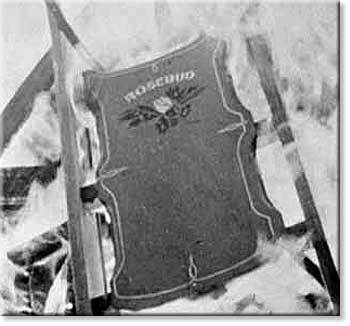The movie opens showing the death of Charles Foster Kane and a newsreel of his life. We get a basic overview of his life story: his two failed marriages, his time as a newspaper man, and his final days in Xanadu. This newsreel gives us a timeline because the rest of the movie jumps between different parts of his life. Mr. Thompson is a reporter who is assigned to figure out what Kane's last word meant: "Rosebud." He speaks with anyone who might have known Mr. Kane- from his ex-wife to his ex-friend, searching for the meaning of Rosebud. It is from this search that we truly see the life of Mr. Kane unfold. Throughout the movie, we see Kane torn from his family and sent to boarding school in the East. When he comes into his fortune, he decides to take over the Inquirer, running stories with little evidence to back them up. He runs for governor, and his first marriage ends when he chooses a "singer" over his wife and career. There is a great montage where we see his marriage decline in a series of breakfasts. At each breakfast, the relationship between him and his wife gets colder and more detached. He then tries to make his second wife Susan Alexander an opera star, and he ends up being the only one clapping in a crowded theater after her first performance. He builds her a palace that becomes her prison, and she starts to work on jigsaw puzzles to pass the time. When she finally leaves him and his Xanadu palace, he lives there alone, all but forgotten until his death. There is a great scene in the movie after Susan leaves where Kane is walking away past a mirror and we see Kane after Kane walking silently away.
 There were always different Charles Foster Kanes. There was Kane the newspaper producer, Kane the young boy, Kane the fighter for the underprivileged, and finally Kane as he is in his final days: completely alone.
There were always different Charles Foster Kanes. There was Kane the newspaper producer, Kane the young boy, Kane the fighter for the underprivileged, and finally Kane as he is in his final days: completely alone.While speaking with those who knew Mr. Kane, Mr. Thompson records a lot about him. When speaking with Jedediah Leland, Leland tells him, "maybe I wasn't his friend, but if I wasn't he never had one." He also tells Mr. Thonpson, "That's all he ever wanted out of live... was love. That's the tragedy of Charles Foster Kane.You see, he just didn't have any to give." Mr. Kane is a very complex character, and we never truly figure him out. After Mr. Thompson gives up trying to figure out what Rosebud means his last words in the movie are as follows: Mr. Kane was a man who got everything he wanted, and then lost it. Maybe Rosebud was something he couldn't get, or something he lost. Anyway, it wouldn't have explained anything... I don't think any word can explain a man's life." As we watch it burn, only the audience ever finds out what Rosebud is- his childhood sled.
 However, we too are lost when it comes to the meaning of Rosebud. Does it represent the childhood he never got? Trying to go back and relive the only time he may have ever been happy and loved? Is it a call to his former innocence? We will never know.
However, we too are lost when it comes to the meaning of Rosebud. Does it represent the childhood he never got? Trying to go back and relive the only time he may have ever been happy and loved? Is it a call to his former innocence? We will never know.Citizen Kane is one of those movies that, decades later, we can still relate to. The screenplay was originally called, "The American," and in a way Charles Foster Kane as an archetypal American is still prevalent in modern America. If it were not for the black and white and the costumes, you would never know this was filmed in the 40's. From its ingenious cinematography to its timeless nature, one can easily see how this movie has solidified its ranking as #1 for the past few decades. Do I think it is the best movie ever made? I do not know, so I guess you will just have to watch it and decide for yourself.
No comments:
Post a Comment